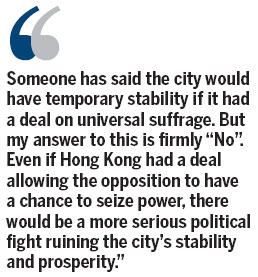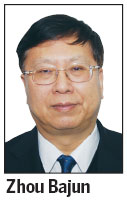Where will Hong Kong run to in the Year of the Horse?
Updated: 2014-01-27 08:08
By Zhou Bajun(HK Edition)
|
|||||||||
The Year of the Horse on the Chinese lunar calendar is just around the corner. The city will celebrate the traditional festival while its political struggles intensify.
On Dec 4, the HKSAR government started the public consultation on arrangements for the Chief Executive (CE) election in 2017 and Legislative Council (LegCo) election in 2016 (two elections). Having for two months listened to every sector of society and gathered opinions from all political groups, the responsible official of the Task Force on Constitutional Development (TFCD) hinted that, after the Lunar New Year, the public consultation would enter the second phase lasting until May 4.
During the past two months of public consultation, the opposition camp has been not only undertaking the "Occupy Central" campaign, but also putting forward schemes focusing on what they call "real" universal suffrage. The irreconcilable conflict between the opposition and the "Love the Nation, Love Hong Kong" camps has been fully reflected in the methods of nominating CE candidates. Despite differences over the "triple-track format" (civil nomination, party nomination and nomination by individual members of the Nominating Committee) and "double-track format" (civil nomination and nomination by a Nominating Committee), the opposition camp unanimously wants at least one representative of theirs in the race for the CE office.
The government has remained above the debate by not taking sides on any particular proposal in the past two months' consultation. On Jan 20, Secretary for Constitutional and Mainland Affairs Raymond Tam told the media: "We would not take any concrete position because it would not be fair and it is not appropriate for us to take such a position knowing the community actually still has a wide range of opinions on specific proposals, especially on some of the core issues raised by political parties". Tam promised that in the next three months' consultation the government "will continue to adopt a very open and listening mode to all sorts of proposals."

It would be understandable if the government took a neutral stance at the very beginning of the public consultation, after fierce attacks from the opposition on the Basic Law and decisions by the National People's Congress Standing Committee (NPCSC). But the government should not assume a political compromise could be achieved with such passive tactics.
In my column on Dec 25, I noted that: "Given that the central authorities cannot allow the opposition to obtain control of the HKSAR, it is impossible for the government to maintain a neutral position during the public consultation. Assuming the government is not being overwhelmed by unprecedented difficulties in governing, it is showing a lack of political will." Along with the ongoing public consultation, the opposition and the "Love the Nation, Love Hong Kong" camp will all press the government much more. The CE and his ruling team have no alternative, but to make a definite choice as soon as possible.
In particular, members of the TFCD should stay clearheaded. The so-called "neutrality" camp cannot persuade the opposition to get back on the right track of the city's constitutional development stipulated by the Basic Law and decisions by the NPCSC. This is because politics is politics and is all about struggling for power. Here in Hong Kong, the opposition will never stop trying to seize more power.

The Year of the Horse will witness Hong Kong's determination to move forward. The city isn't simply confronting universal suffrage - it is facing up to how to handle its relationship with the mainland and the central government. Someone has said the city would have temporary stability if it had a deal on universal suffrage. But my answer to this is firmly "No". Even if Hong Kong had a deal allowing the opposition to have a chance to seize power, there would be a more serious political fight ruining the city's stability and prosperity.
Fundamentally, the SAR has yet to prepare for successful universal suffrage based on a common destiny. This includes all residents with new "core values" aligning together for the time being. As long as the community is divided and new immigrants face discrimination, implementing universal suffrage is likely to introduce endless political and social struggles into the city. These are similar to some events occurring in some Southeast Asian countries.
The author is a veteran current affairs commentator.
(HK Edition 01/27/2014 page1)